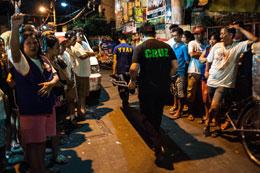Pinoys in Canada, US rally behind drug war

Eric Sison was still alive after he fell three storeys from the roof opposite Maria's house, snagged his shorts on her neighbours' awning, and, in his underwear, crawled underneath her bed.
When the police drew back the yellow curtain that partitions her shanty home from Pasay City's F Munoz street, Maria faced their gun barrels. "I shouted, 'Have mercy on us, don't fire, we don't know who this guy is,'" she told Al Jazeera through an interpreter.
The police told Maria and her family to leave their house. She heard Sison plead for his life. And then she heard the gunshots.
Sison is one of more than 2,500 people to have been killed between July 1 and September 5 during President Duterte's bloody war on drugs, which has had a death rate of about 38 people per day.
A Philippine National Report released last weekend said that a total of 1,466 suspected people involved in drugs were killed during police operations. Another 1,490 were killed by suspected vigilantes since Duterte took over as President.
More than 16,000 suspects involved in illegal drugs have been arrested while the number of those who voluntarily handed themselves in numbered 700,000, the Philippines Star reported.
While Western nations, leaders and activists have condemned the vigilante killings, Asian nations embolden by the reported success in reducing the drug inflow into the Philippines are resorting to adopt hardline anti-narcotics policies. Experts say they are likely to only make things worse but Pinoys in the U.S. and Canada say Duterte is doing the right thing.
Filipinos in the United States and Canada held rallies last Sunday to show their support to Duterte’s all-out war to end the drug menace gripping the Philippines.
“There is no political color here. Like every Filipino, we simply want to save our country!” said Jess A. Gatchalian, one of the organizers of the newly formed group called US Pinoys for Real Change in the Philippines (USPRCP), in an e-mail
Gatchalian said that the rallies were held in Washington, DC, Anchorage, Las Vegas and Vancouver in Canada where thousands of Filipino immigrants live, he said.
The blood anti-drug drivein the Philippines has prompted neighboring Indonesia to declare a "narcotics emergency" and resume executing drug convicts after a long hiatus.
In Thailand and Myanmar, petty drug users are being sentenced to long jail terms in prisons already bursting at the seams due to the soaring popularity of methamphetamine - a cheap and highly addictive drug also known as meth.
Geoff Monaghan investigated narco-trafficking gangs during his 30-year career as a detective with London's Metropolitan Police, then witnessed the impact of draconian anti-drug policies as an HIV/AIDS expert in Russia.
He believes President Duterte's anti-drugs campaign in the Philippines will fuel more violence and entrench rather than uproot trafficking networks. "I'm very fearful about the situation," he said, according to a news report in Asia.
Reflecting the regional explosion in use, the amount of meth seized in East and Southeast Asia almost quadrupled from about 11 tons in 2009 to 42 tons in 2013, said the United Nations Office on Drugs and Crime (UNODC).
Meth was the "primary drug of concern" in nine Asian countries, the UNODC said, including Indonesia, the Philippines, Thailand, Japan and South Korea.
A rising chorus of experts blame this surge in production and use of meth in Asia on ineffective and even counterproductive government responses.
They say national drug-control policies are skewed towards harsh measures that criminalize users but have failed to staunch the deluge of drugs or catch the kingpins behind it.
They also want a greater emphasis on reducing demand through more and better quality drug rehabilitation.
"There is so much scaremongering and hysteria surrounding the issue of drugs," says Gloria Lai of the International Drug Policy Consortium (IDPC), a global network of 154 non-governmental groups. "That's a disincentive for challenging old ways of thinking."
Meth is a transnational business, worth around $15 billion in mainland Southeast Asia alone in 2013, the UNODC says.
Much of the production takes place in laboratories in lawless western Myanmar. Ingredients such as pseudoephedrine and caffeine are smuggled across porous borders from India, China and Vietnam.
Laos and Thailand are major trafficking routes, with the finished product traveling by road or along the Mekong River for distribution throughout Southeast Asia and China.
Meth is sold in cheap pills called "ya ba", a Thai name meaning "crazy medicine", or in a more potent, crystalline form known as "crystal meth", "ice" or "shabu".
Contraband is effectively hidden amid rising volumes of regional trade, leaving law enforcement to play catch-up, said Jeremy Douglas, the UNODC's Asia Pacific chief.
"We need to start thinking about big-time regional engagement, up to the highest level. It's impossible to deal with the problem on a country-by-country basis," he said.
"I can't recall the last time a major trafficking kingpin was caught."
The meth explosion carries huge social consequences: overburdened health services, overcrowded prisons, families and communities torn apart.
Small-time users and dealers bear the brunt of unsparing law enforcement that is popular in crime-weary communities. In mid-July, as drug war killings escalated in the Philippines, one survey put President Duterte's approval rating at 91 percent.
Thailand launched an equally popular "war on drugs" in 2003 that killed about 2,800 people in three months. But figures show it had no lasting impact on meth supply or demand in Thailand.
Policy in Asia is largely moving in the opposite direction, with drug rehabilitation underfunded and inadequate.
Less than 1 percent of dependent drug users in Indonesia got treatment in 2014, said the UNODC. Lacking alternatives, desperate Indonesians resort to herbal baths, Islamic prayer and other remedies of unproven efficacy.
"Rehab" in many countries often means detention at a state facility.









